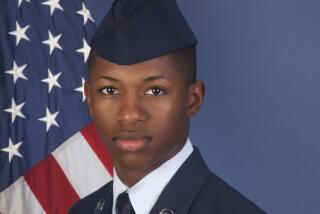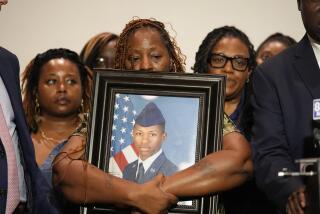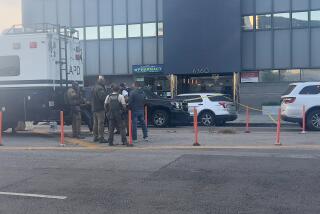Shooting Illustrates Air Safety Conflict
- Share via
WASHINGTON — The shooting incident at Miami International Airport on Wednesday produced the first real-world, life-or-death test of the federal air marshal system since the Sept. 11 hijackings. And in the immediate aftermath, federal officials said it appeared the marshals had followed established procedures and done exactly what they were supposed to do in bringing down a man who said he had a bomb.
But given the circumstances of the case -- the man authorities killed turned out to be an unarmed mental patient with no explosives -- security experts in and out of government are beginning what probably will be a long and careful examination of difficult questions: Can the system be refined to protect travelers while building in greater safeguards? Or does the price of safeguarding air travel include the possibility that innocent Americans will die?
Federal officials and outside experts insisted Thursday that it would be wrong to second-guess the two air marshals who were aboard the American Airlines plane that was preparing for takeoff when an agitated passenger reportedly shouted that he had a bomb.
“It is a very unfortunate situation, but I cannot fault the air marshals involved or the protocols they are using,” said Michael Greenberger, a former Justice Department official who is director of the Center for Health and Homeland Security at the University of Maryland. “It is sort of the worst-case scenario,” he said, and even though the marshals did everything right, “you wish you could have a do-over.”
Greenberger and others emphasized that the catastrophe that would result from a bomb exploding on or near a loaded airliner gives air marshals and other security personnel little time to seek information -- and almost no margin for error.
Rigoberto Alpizar, 44, was shot after he ran from the plane toward the jetway and reached in his carry-on bag. His wife reportedly yelled that Alpizar was mentally ill.
The air marshals had to make a “split-second decision. It is very difficult,” Greenberger said, pointing out that the wife’s action “could have been a ploy.”
The episode in Miami will come under extensive review and probably prompt consideration of how the air marshal system might be fine-tuned.
“There are, unfortunately, probably every day in America law enforcement shootings, but there are procedures that should be followed afterward,” said Rep. Peter A. DeFazio (D-Ore.), a member of the House Homeland Security Committee. “We will wait for that to happen, and we will not prejudge the situation.”
The two air marshals involved have been placed on administrative leave while the incident is under investigation, as is routine, said Brian Doyle, spokesman for the Homeland Security Department.
Many security and law enforcement experts said Thursday that the shooting may have been an unfortunate byproduct of the porous nature of the current system for screening airline passengers.
“Air marshals have zero trust in the screeners,” said one marshal who requested anonymity. Because Homeland Security policy forbids marshals from speaking out about their job or criticizing the service, no marshals would speak for attribution. One air marshal is suing Homeland Security over the policy.
I.C. Smith, a retired FBI agent and national security expert, said: “It is clear these marshals know that these security checkpoints are not fail-safe. You read about reports all the time of stuff slipping through. They have to really expect the worst. And I think that is probably what happened in this case.”
DeFazio said the shooting should prompt reassessment of screening procedures and equipment that he called outdated.
“We’re running passenger checkpoints for carry-on bags that are incapable of finding plastic explosives,” DeFazio said by telephone from an airport where he was waiting for a flight. “The kind of X-rays they’re using were thrown out of the Capitol years ago because they weren’t able to catch anything.
“We have technologies -- walk-through portals -- but the administration doesn’t want to spend the money to buy it,” he said.
But, said Jon Adler, president of the Law Enforcement Agents Assn., “The fact that [Alpizar] did not ultimately have a bomb is not relevant to the action taken by the air marshals.
“You take these actions based on a threat assessment and the communications, not on the consequence,” he said. “In Hollywood, the good guys wait for the bad guys to shoot. If you do that in real life, you die. If you wait to see a gun, the person initiating the threat will be able to fire that gun before you can react.”
Other security experts said the shooting should not be used to judge the efficacy of the air marshal program or justify new weapons restrictions. Former and current marshals pointed out that those aboard the plane in Miami had many factors to consider as they dealt with Alpizar -- including the possibility that he may have been a decoy to draw the marshals out so others on the plane could identify them.
“If someone is on an aircraft and threatening that they have a bomb, then the public should expect the Federal Air Marshal Service to do whatever it takes to stop that person,” former air marshal John Bottone said. “No one wants to see another 9/11.”
Few aviation security experts expected a public backlash. “Anybody who looks at it rationally will say it’s unfortunate, but these things happen,” said David Laird, president of Laird & Associates, an aviation security consulting firm. “I don’t believe they had any choice; they were faced with a terrible dilemma and did what they had to do.”
Laird put public support for the marshals at “close to 100%.”
Others said they believed the shooting showed that post-Sept. 11 security measures were effective. “The system worked,” said Rep. Dan Lungren (R-Gold River), a member of the Homeland Security Committee. “This should be a message to anybody trying to use explosives that we mean what we say.”
“I think we’ll look at it, but as far as I can ascertain ... the system worked exactly as it was designed,” said Rep. John L. Mica (R-Fla.).
“Any individual who announces that they have a bomb, acts in an erratic manner and doesn’t pay attention to the commands of federal marshals will pay the consequences.”
*
Times staff writer Emma Vaughn contributed to this report.
More to Read
Sign up for Essential California
The most important California stories and recommendations in your inbox every morning.
You may occasionally receive promotional content from the Los Angeles Times.













